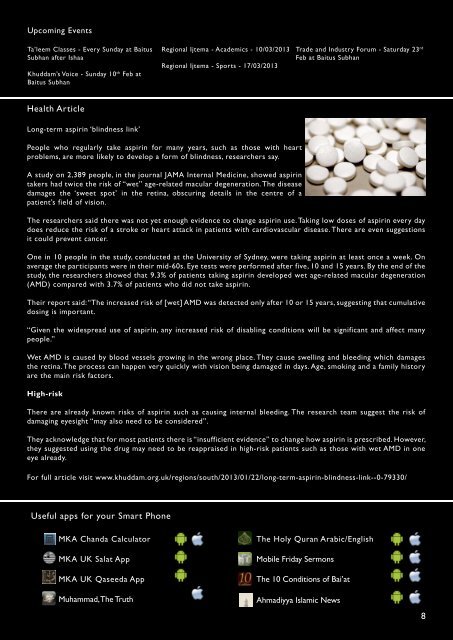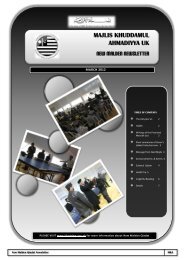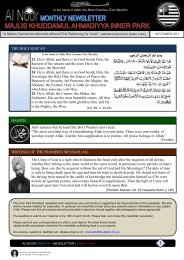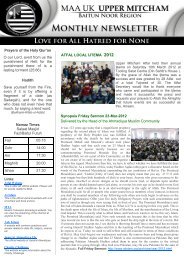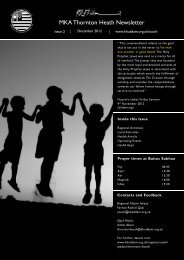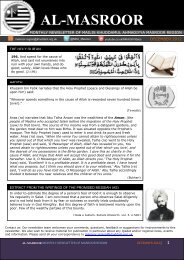newsletter W Croydon Jan 13.indd - Majlis Khuddamul Ahmadiyya ...
newsletter W Croydon Jan 13.indd - Majlis Khuddamul Ahmadiyya ...
newsletter W Croydon Jan 13.indd - Majlis Khuddamul Ahmadiyya ...
Create successful ePaper yourself
Turn your PDF publications into a flip-book with our unique Google optimized e-Paper software.
Upcoming Events<br />
Ta’leem Classes - Every Sunday at Baitus<br />
Subhan after Ishaa<br />
Khuddam’s Voice - Sunday 10 th Feb at<br />
Baitus Subhan<br />
Regional Ijtema - Academics - 10/03/2013<br />
Regional Ijtema - Sports - 17/03/2013<br />
Trade and Industry Forum - Saturday 23 rd<br />
Feb at Baitus Subhan<br />
Health Article<br />
Long-term aspirin ‘blindness link’<br />
People who regularly take aspirin for many years, such as those with heart<br />
problems, are more likely to develop a form of blindness, researchers say.<br />
A study on 2,389 people, in the journal JAMA Internal Medicine, showed aspirin<br />
takers had twice the risk of “wet” age-related macular degeneration. The disease<br />
damages the ‘sweet spot’ in the retina, obscuring details in the centre of a<br />
patient’s field of vision.<br />
The researchers said there was not yet enough evidence to change aspirin use. Taking low doses of aspirin every day<br />
does reduce the risk of a stroke or heart attack in patients with cardiovascular disease. There are even suggestions<br />
it could prevent cancer.<br />
One in 10 people in the study, conducted at the University of Sydney, were taking aspirin at least once a week. On<br />
average the participants were in their mid-60s. Eye tests were performed after five, 10 and 15 years. By the end of the<br />
study, the researchers showed that 9.3% of patients taking aspirin developed wet age-related macular degeneration<br />
(AMD) compared with 3.7% of patients who did not take aspirin.<br />
Their report said: “The increased risk of [wet] AMD was detected only after 10 or 15 years, suggesting that cumulative<br />
dosing is important.<br />
“Given the widespread use of aspirin, any increased risk of disabling conditions will be significant and affect many<br />
people.”<br />
Wet AMD is caused by blood vessels growing in the wrong place. They cause swelling and bleeding which damages<br />
the retina. The process can happen very quickly with vision being damaged in days. Age, smoking and a family history<br />
are the main risk factors.<br />
High-risk<br />
There are already known risks of aspirin such as causing internal bleeding. The research team suggest the risk of<br />
damaging eyesight “may also need to be considered”.<br />
They acknowledge that for most patients there is “insufficient evidence” to change how aspirin is prescribed. However,<br />
they suggested using the drug may need to be reappraised in high-risk patients such as those with wet AMD in one<br />
eye already.<br />
For full article visit www.khuddam.org.uk/regions/south/2013/01/22/long-term-aspirin-blindness-link--0-79330/<br />
Useful apps for your Smart Phone<br />
MKA Chanda Calculator<br />
MKA UK Salat App<br />
MKA UK Qaseeda App<br />
Muhammad, The Truth<br />
The Holy Quran Arabic/English<br />
Mobile Friday Sermons<br />
The 10 Conditions of Bai’at<br />
<strong>Ahmadiyya</strong> Islamic News<br />
8


